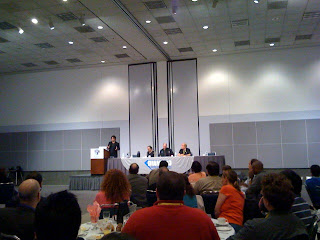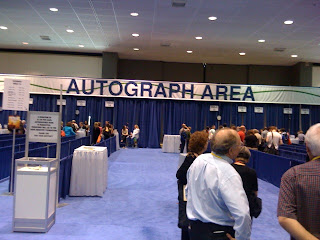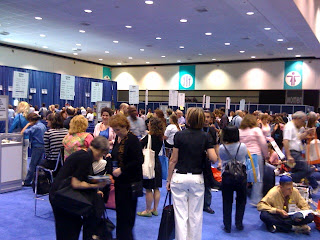What’s playing on the iPod right now? BACK HOME AGAIN by John Denver
Here’s how I can sum up my BEA. With the exception of the Graphic Novel Author Breakfast on Saturday morning, any event I had planned to attend was a bust—real snoozers.
And the one panel that was a spontaneous choice was the one I enjoyed the most—and that was the panel discussion on Hardcover versus original trade paperback for a debut novel.
Basically there was no consensus on whether it helps or hurts an author. Several examples were given for both—of how a trade price point really helped to break out an author and how an author got sunk by the hardcover pub with the higher price point.
There was even mention of my larger concern about not getting the audio deal and foreign rights for an original trade pb (although I have to say that foreign publishers seem very flexible with what they buy and the format doesn’t seem to impact too much).
My hope was that the discussion could veer into new territories, like setting up the possibility of rethinking how original trade paperbacks are bought, their marketing/promo plans (because let’s face it, as agents we are mostly worried about original trades not getting the love from pr and marketing and the reviews needed to really succeed as those aspects have been slow to evolve), and perhaps discuss new trade original royalty structures if more and more books are pubbed as original trades and not hardcovers. Those percentages haven’t changed in a hefty while
I don’t care if something is going to pub in trade pb if I know I can get the support, the backing, and that my author could earn as much via that medium than through hardcover as the original format.
Lots about pubbing original trade make sense and yet, there’s still those possible issues that make it hard not to be hesitant. Still, I see it’s where the industry seems to be leaning so I’d just like to see some other aspects about this format embraced.
But back to the Graphic novel breakfast.

From left: Jeff Smith (author of Bone), Jeph Loeb (producer of Heroes and currently writing Hulk for Marvel), Mike Mignola (Hellboy), and Art Spiegelman (Pulitzer Prize-winner of Maus)
Here’s what I learned. Folks who write and illustrate comic books are passionate about them and a lot of writers have been doing this for some time—long before it was popular.
1. They all were slightly amused by the term graphic novelists.
2. They are, and always will be, comic book writers, thank you very much.
3. They are all slightly amused to be considered “cool” now as well.
The tipping point for comic books happened, for some reason, about 4 or 5 years ago and they knew it when librarians started coming to them with “no need to sell me on the format, I get it but what should I be buying? What’s Good?” That’s when the format had arrived into the mainstream. It’s also not just about comic book publishers anymore. Many traditional publishing imprints (like S&S and Random House) are buying comic books and positioning them like traditional books (for lack of a better word).
I found the whole breakfast, and especially Spiegelman’s visual presentation about the history and the how and why of how he go into it, particularly fascinating.
I certainly can’t say that I’ve been a long-time fan or anything like that but I’m interested. I certainly had a bunch of comic books when I was growing up (boy did this bring back memories) and many of my college buddies wrote, illustrated, and collected comic books so I was certainly exposed to the medium. Now I just need to get back in touch with those guys and say, “hey, your time has come. Maybe we need to dig out those works.”
Last but not least, I thought you’d get a kick out of seeing the author autographing stalls. One author called it horse racing in reverse. It does rather mimic that!



.jpg)
.jpg)
.jpg)